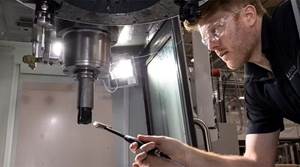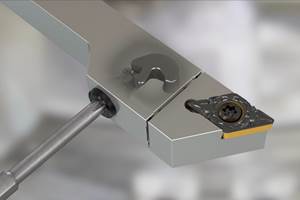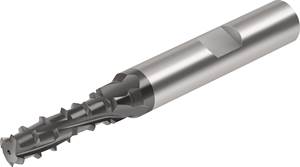Milling System Keeps Valve Production Flowing Smoothly
Carbide inserts proved to be too slow in the milling of three Inconel high-performance alloys used in the manufacture of valve components for oil drilling and other industrial and commercial applications.
Share





Carbide inserts proved to be too slow in the milling of three Inconel high-performance alloys used in the manufacture of valve components for oil drilling and other industrial and commercial applications. FMC technologies, Inc. Fluid Control Division’s plant (Stephenville, Texas) turned to Kennametal (Latrobe, Pennsylvania) for a solution.
“After 6 to 8 hours of training, productivity gains that our engineers and machinists saw in the tests made them absorb this technology instantly, because the time and money savings are significant,” says Fred Charlton. Mr. Charlton, a senior manufacturing engineer led to FMC’s inclusion of Kyon 2100 RNG 45-T ceramic inserts in the production process to meet customers’ increasing demand for valves made of longer-lasting exotic metals.
In addition to being impressed with the ability of the ceramic inserts to cut six times faster than the carbide ones, Mr. Charlton and his colleagues were also amazed by the fact that all three materials—825,718 and 625 Inconel can be milled successfully with Kyon 2100, making it unnecessary to experience long periods of downtime to change tooling.
Kyon 2100 is a silicon nitride-based ceramic (SiALON) with a high resistance to thermal and mechanical shock, and depth-of-cut notching, two properties that are said to be useful for milling nickel- and cobalt-based heat-resistant materials.
FMC Technologies began comparing the performance of carbide inserts to Kyon 2100 RNG 45-T ceramic inserts in the high-performance milling of 825 Inconel to produce an integral tee, of 718 Inconel for manufacturing a part of the valve stem, and of 625 Inconel for creating a weld inlay of the valve body. Three months later, FMC moved the ceramic inserts onto the shop floor.
“The cutting speed and quality of the finish that Kyon 2100 gives are most impressive, especially on 718 Inconel, which is some nasty stuff,” says Mr. Charlton.
FMC, a Chicago-based producer of mission-critical technology solutions for the energy, food processing and air transportation industries, then moved production, and a half-dozen workers, to Stephenville, which is located about 80 miles southwest of Ft. Worth. The plant employs 450 people in the manufacture of fluid-control products, including metering equipment, flow control valves and joints, pumps, and manifold systems. Valve diameters of these devices range from 2 inches to 26 inches, and they are used in a variety of industrial applications.
“I am impressed by how Fred and his people have taken the technology and run with it,” says Robert White, the Kennametal MSE who helped Mr. Charlton decide on the Kyon 2100 inserts. “They have done an outstanding job of applying our high-performance milling solution in textbook fashion.”
Using a 12-year-old LeBlond Makino 86 horizontal machining center that is capable of a maximum 4,000 rpm and 50 taper, FMC was able to reach cutting speeds of 80 to 100 sfm (depending on specific part) using carbide inserts. In contrast, Kyon 2100 enabled the machine to cut at 4,000 sfm.
“The tooling is capable of allowing us to reach higher sfm values, but the machine’s limitations forced us to stop at 4,000 sfm,” explains Mr. Charlton.
With Kyon 2100, FMC achieved a federate of 81 to 84 ipm, compared to just 1.02 to 2.80 ipm when using carbide inserts. For all three applications, the axial and radial depths of cut are both an identical 0.100”.
Although the cost of the new ceramic inserts is 70 percent higher than carbide, the longer lifespan of each insert has decreased the cost per part by 86 to 94 percent.
Using the ceramic inserts has enabled FMC to maximize uptime because the company can use the same kind of insert to mill all three Inconel materials. By having a cutter stocked with fresh inserts always ready to replace spent inserts, changeout time is 10 seconds, compared to minutes when using carbide inserts—a difference that can reduce a job’s time by several hours.
Besides milling valve components made of Inconel faster than ever, using Kyon 2100 ceramic inserts has opened FMC’s eyes to other high-performance milling applications.
“With Kyon 2100, the possibilities are endless for milling Inconels and other exotics, and I look forward to exploring them,” says Mr. Charlton. “These inserts are so versatile that I am also considering their use with 410 stainless steel.”
Related Content
How to Mitigate Chatter to Boost Machining Rates
There are usually better solutions to chatter than just reducing the feed rate. Through vibration analysis, the chatter problem can be solved, enabling much higher metal removal rates, better quality and longer tool life.
Read MoreBriquetting Manufacturer Tools Up for Faster Turnaround Times
To cut out laborious manual processes like hand-grinding, this briquette manufacturer revamped its machining and cutting tool arsenal for faster production.
Read MoreQuick-Change Tool Heads Reduce Setup on Swiss-Type Turning Centers
This new quick-change tooling system enables shops to get more production from their Swiss turning centers through reduced tool setup time and matches the performance of a solid tool.
Read MoreSelecting a Thread Mill That Matches Your Needs
Threading tools with the flexibility to thread a broad variety of holes provide the agility many shops need to stay competitive. They may be the only solution for many difficult materials.
Read MoreRead Next
Setting Up the Building Blocks for a Digital Factory
Woodward Inc. spent over a year developing an API to connect machines to its digital factory. Caron Engineering’s MiConnect has cut most of this process while also granting the shop greater access to machine information.
Read More5 Rules of Thumb for Buying CNC Machine Tools
Use these tips to carefully plan your machine tool purchases and to avoid regretting your decision later.
Read MoreBuilding Out a Foundation for Student Machinists
Autodesk and Haas have teamed up to produce an introductory course for students that covers the basics of CAD, CAM and CNC while providing them with a portfolio part.
Read More

































